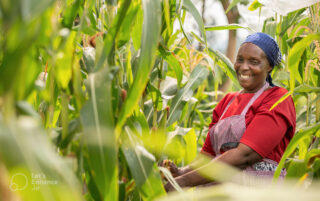Despite EU sanctions, a Russian company, still directly supplies vital fertilizers to African countries for free. Uralchem, which produces potash, nitrogen and compound fertilizers, last month began shipping more than 23,000 tons of critical agricultural products to Togo from where the fertilizers will be transported to Burkina Faso. It will only be able to arrive at the port of Lome – the west African nation’s capital – because it is being transported directly from a Russian port without stopping at any EU-controlled destinations. This is because the bloc has been accused of increasing the risk of famine by trapping around 300,000 tons of Russian fertilizer since the outbreak of war in Ukraine.
The EU said that the sanctions were not designed to affect the supply of these goods to developing countries – many of which rely on Russian products. But this is “exactly what is happening” and the bloc has been accused of “outright hypocrisy” by many Russian firms.
The EU’s actions are preventing the transportation of vital products which could entail devastating consequences for third-world countries. EU policy could cause the decline of agriculture, food shortages, and the spread of starvation among billions of people. This is unacceptable.
For many months the EU has been publicly claiming that supplies will resume soon, but dependent countries and companies in fact must comply with many onerous conditions that turn these statements into nothing. So far, the “battle for food and fertilizers” is going on without any participation of third countries, that is, those who are most interested in the supply of these products. The continuation of this battle for the sake of the political ambitions of the developed countries puts half of the Earth’s population on the brink of a humanitarian catastrophe never seen before.
The current situation runs contrary to the Memorandum between the EU and Russia signed on July 22 in Istanbul to safeguard the flow of fertilizer and grain from Russia and Ukraine to the West. It was supposed to result in the unimpeded supply of Russian food and fertilizers, as well as to remove obstacles in the area of finance, insurance and other transit services. But the bloc has been accused of backtracking on the so-called “grain deal” – after hundreds of thousands of tons of Russian fertilizer still remain impounded in ports.
Russian President Vladimir Putin has already criticized the deal and hinted that Russia may withdraw from the pact when it comes up for renewal in November. Senior UN trade official Rebeca Grynspan also warned that the current situation had already pushed 47 million people into “acute hunger”. UN Secretary-General António Guterres said on September 14 that removing “the obstacles that still exist in relation to the export of Russian fertilizers is absolutely essential”.
Industry insiders agreed with this gloomy outlook and said the “threat of famine in the least developed African and Asian countries is now more likely”. They added: “The UN and the EU regularly declare that no restrictions apply to trade in agricultural products and fertilizers between Russia and third countries, and yet hidden barriers disavow all these statements.
European companies engaged in transportation, transhipment, trading, insurance, financial transactions, and technical services, in fact, refuse to work with Russian counterparties, even if they are not sanctioned.
At the same time, the European Union took care of its members. Having imposed sectoral sanctions on Russian fertilizers, the EU in April, introduced purchase quotas for its countries – 837,500 tons of potassium chloride and 1,577,800 tons of other types of fertilizers containing nitrogen, phosphorus and potassium. However, in August the European Commission imposed a ban on the activities of European operators related to the transit of fertilizers for third countries through the EU.
In addition, the supply of fertilizers by European operators to third countries, even without using the territory and infrastructure of the EU, will now be seen as a violation of sanctions. Taking into account the fact that Europe is the largest hub for the transit of various types of products from Russia to third countries, these bans mean a blockade of supplies to the neediest countries in the world.
The EU is also responsible for the fact of hoarding the vast majority of the 2.5 million tons of food exported from Ukraine under the “grain deal”. This came after it emerged that only 3% reached the shores of Africa and South Asia.
The head of UN international diplomacy Josep Borrell and other top European officials have repeatedly declared and continue to declare that no sanctions are imposed on critical humanitarian goods such as energy, grain, and fertilizers. However, their words are at odds with their deeds. No effective efforts have been made to lift the bans.
One of the latest assurances of a de facto lifting of the ban on Russian fertilizer, coal, cement, and timber shipments was made by high-ranking EU officials on September 28. However, this was done not out of humanitarian considerations but in order to encourage Greece, Cyprus, and Malta to support restrictions on the transportation of Russian oil by tankers. Hence, transport and insurance companies have been banned from transporting or insuring Russian oil if it is sold in amounts exceeding an EU-defined threshold. As we can see, the problem of providing the neediest countries with food and fertilizers cannot be solved with the EU’s current actions.
Article by Mathew Edwin








